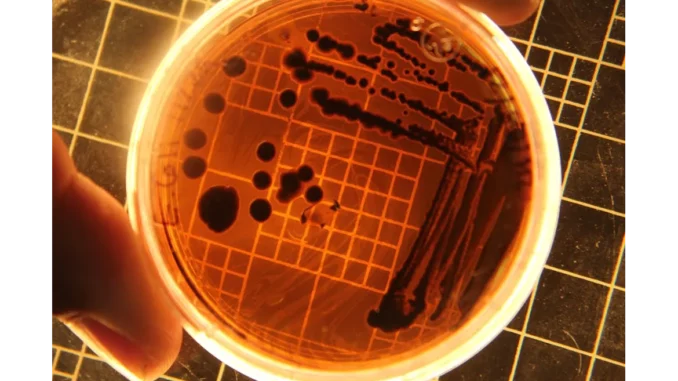
In the field of microbiology, few challenges are as persistently complex as the ongoing battle between pathogens and our immune defences. I recently had the opportunity to speak with Dr. Emma Clark, a postdoctoral researcher at UC Davis Health, whose work has significantly contributed to a groundbreaking study on how Salmonella bacteria manage to elude our gut’s natural defences. Her insights provided a captivating look into the microscopic skirmishes within our digestive systems.
Dr. Clark’s enthusiasm for her field was palpable as she explained the dynamics of this biological struggle. “It’s much like a strategic game of chess,” she remarked, illustrating the cunning nature of Salmonella as it continually outmanoeuvres our gut’s protective mechanisms. The study, which was published in the Proceedings of the National Academy of Sciences, reveals the sophisticated strategies that Salmonella employs to colonise the gut. “The gut is home to trillions of bacteria, many of which produce short-chain fatty acids (SCFAs) that serve as sentinels, warding off harmful pathogens,” Dr. Clark elucidated. “Yet, Salmonella has crafted a clever method to circumvent these defences.”
The research team, led by the esteemed Professor Andreas Bäumler, uncovered the tactics employed by the pathogen. “We found that the crux of the matter lies in how Salmonella manipulates the nutrient balance within the gut,” Dr. Clark explained with evident zeal. “Upon entering the small intestine, it instigates inflammation, thereby disrupting the absorption of crucial amino acids from our food.” This disruption results in a nutrient imbalance within the gut, effectively creating a resource-rich environment in the large intestine that favours Salmonella’s survival and proliferation.
By employing a mouse model, the team meticulously traced the absorption patterns of amino acids in the intestines. Dr. Clark elaborated on a pivotal discovery: “In mice infected with Salmonella, we observed a reduced absorption of amino acids into the bloodstream, leaving an abundance of lysine and ornithine in the gut. These amino acids are vital in neutralising the growth-inhibiting effects of SCFAs.” This revelation highlights a sophisticated interplay of chemistry and biology, where Salmonella deftly evades the body’s natural defences by activating specific enzymes to break down these crucial amino acids, thereby restoring its acidity balance.
The ramifications of these findings extend beyond merely understanding Salmonella’s mechanisms. “Our research offers valuable insights into the changes that occur in the gut environment during inflammatory bowel disorders, such as Crohn’s disease and ulcerative colitis,” Dr. Clark noted. “By comprehending these mechanisms, we can explore new treatments designed to bolster gut health and prevent infections.” She emphasised the potential for developing probiotics or dietary plans that could enhance the gut microbiota. “A holistic approach to gut health is essential,” she asserted. “We’re not only examining how Salmonella operates but also exploring how we can use this knowledge to protect and strengthen our natural defences.”
As our conversation concluded, I inquired about the broader implications of their research. Dr. Clark’s response resonated with optimism. “By understanding how a pathogen manipulates the host’s system, we can uncover strategies to boost the host’s natural defences,” she explained. “This could pave the way for innovative treatments that not only combat infections but also maintain a healthy gut microbiota.”
Reflecting on the interview, I was left with a profound appreciation for the intricate interplay between pathogens and our body’s defences, as well as the dedication of scientists like Dr. Clark who tirelessly work to unravel these complexities. Their discoveries hold the promise of more effective treatments and a deeper understanding of the microscopic worlds within us. The study serves as a testament to the power of scientific inquiry and the relentless pursuit of knowledge. As we navigate the challenges posed by pathogens like Salmonella, insights from research such as this illuminate the path forward, offering hope for healthier futures.


Be the first to comment